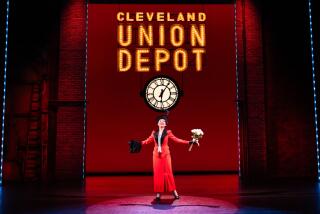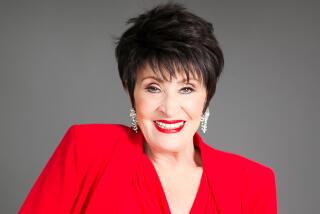Q&A: Chita Rivera on touring, and staying political, at age 84
Chita Rivera originated some of the most indelible roles of Broadway’s Golden Age: Anita in “West Side Story,” Velma in “Chicago,” Rosie in “Bye Bye Birdie.” She also starred in the film version of “Sweet Charity” alongside Shirley MacLaine and Paula Kelly, but Hollywood never called her away from the Great White Way for long.
With parts designed for her by the likes of playwright Terrence McNally, songwriters John Kander and Fred Ebb and choreographer Bob Fosse, she has performed alongside Dick Van Dyke, Gwen Verdon and Liza Minnelli. Evidently not satisfied with nine Tony nominations — and two wins, for “The Rink” (1984) and “Kiss of the Spider Woman” (1993) — she went on to nab a 10th nomination in 2015 for “The Visit.”
For the record:
8:16 a.m. April 19, 2024An earlier version of this article misspelled Liza Minnelli’s name as Minelli and Jule Styne’s name as Julie Stein.
Now 84, she is still touring the country, this time with the one-woman show “Chita: A Legendary Celebration,” in which she reprises her favorite songs and reminisces about her career and creative partnerships.
SIGN UP for the free Essential Arts & Culture newsletter »
Last year’s PBS special “Great Performances — Chita Rivera: A Lot of Livin’ to Do” is bursting with decades of clips that convey Rivera’s vivid stage presence, powerful vocals and sensuous dancing. But for fans who know the best way to experience her talents is live, Rivera comes to the Broad Stage in Santa Monica on Friday. The Times caught up with her by phone from New York before her trip west.
So I guess it’s safe to assume you enjoy being on the road?
I do. Well, they call it the road, but really it’s traveling across this beautiful country, visiting wonderful theaters in so many cities. People seem to think the only place there’s theater is New York City. Well, that’s not true. There are people who love the theater all through this country, and why shouldn’t they have top-drawer entertainment. I’m not saying that I am, but I’m certainly experienced! Why shouldn’t everybody visit these towns and give them good theater?
Aren’t you ever tempted to hang up the dancing shoes and rest on your laurels?
I don’t know what laurels are. I wouldn’t know what they looked like if I fell over them. … And no! What do you want to stop for? You don’t want to get roots; they pull you down. I think I’m pretty lucky to be able to travel. If my daughter Lisa [Mordente] is free, she comes. We always look forward to California. We lived there for 10 years. Lisa went to school out there and has many, many friends. I kind of think she likes California better than New York.
Lisa followed you into the family business. Did you encourage her, or did you want her to do something besides showbiz?
She was always musical, even when she was tiny. I put her in ballet school when she was little, because I think it’s very good for young girls — and boys — to become in touch with their bodies and their imaginations, and for girls, grace. And then we discovered that she really had some wonderful talents. She’s been nominated twice for Tonys and things like that. It just happened that way. I did not push. I don’t push.
But you probably made it look like a lot of fun to her.
I certainly wasn’t gonna show her the bruises from ballet class …
You have maybe one of the best discovery stories in Broadway history. Is it true that while you were in ballet school, you went to a friend’s audition for the musical “Call Me Madam,” just for moral support, and you got cast?
I’m sure there are better stories than that. But yes. I’m glad I wasn’t on the other end of the story! She was a great gal. I have not seen her since then, actually. But that is a true story. I went to give her support, and I ended up getting the role.
You started out on Broadway dancing in the chorus, and you’ve said you didn’t initially consider yourself a singer. But you’ve done quite a lot of singing. How did that come about?
It comes from time. I’ve had great teachers like Kander and Ebb, and Jule Styne, some of the greatest people, like Bob Fosse. They would have a show. I would be asked to be in it, or I would audition for it, and I would do this great material. And that’s how I learned.
There’s a word you use for yourself, “gypsy,” that non-dancers might not understand. What does it mean to you?
Gypsy is an honorary title, really. You see, dancers are very special people. They’re used to being together and taking care of each other. It’s a compliment when dancers call you a gypsy. And it’s usually a chorus dancer. I got the title years and years ago, and even when I grew and got larger roles out of the chorus, I still considered myself a gypsy. It’s like having a fabulous family, where you take care of each other.
You’ve seen a lot of changes since you started performing on Broadway.
Well, I’ve been in and out of shows, and club acts, and all sorts of things. If you want to say I’ve been alive a long time, yes, I have been!
Is it ever emotionally difficult to look back on your friendships with people who aren’t around anymore?
The past has always been beautiful. What I do is look back and say, “Thank you, God.” Wonderful relationships, wonderful experiences. They’ve made me who I am today. It’s sad to see some pass on, but you still have those wonderful memories. And when you work in the arts, as we are blessed enough to do, you’re able to do their material. Their amazing, creative gifts have been handed over to you. And I really hope that the arts are not destroyed or taken out of the schools, because we need the arts. The kids need music, they need to explore their own talent, and they can’t do that without support.
Do you consider yourself a political person?
Well, you know, this particular president that we have now has kind of forced all of us to find out what we’re made of. We really have to use what we’ve got and try to keep and make better our relationships with everyone.
Diversity is vital. Women’s rights are vital. You can’t sit back. You have to speak up and speak out. The arts are threatened right now, and we can’t let that happen. We’ve been doing some wonderful things here. Seth Rudetsky and his partner, James Wesley — just when you think, “Oh my God, what can I do to help our causes that are in trouble?” Seth and James call and say, “Let’s do something.” We just did a fabulous show here at Town Hall. [Organizers of the “Concert for America: Stand Up, Sing Out!” said in a statement that the New York event last month “was intended to remind people across the country that we are stronger united and our voices will be heard over the next four years.”]
As a woman of Puerto Rican descent, you opened doors and gave hope to people. Did you ever find it hard to be in that position, or did you just run with it?
I did both. I definitely took it and ran with it. Diversity is such a wonderful thing because we all have so much to offer. I was fortunate enough to get “West Side Story.” I was also lucky enough to play Greek, Italian. Never Scandinavian or pure Caucasian. Well, actually, that’s not true: I did do the very first impersonation of Marilyn Monroe. With a blond wig you can do an awful lot! Which only proves that we’re all very much the same.
Chita Rivera
Where: The Broad Stage, 1310 11th St., Santa Monica
When: 7:30 p.m. Friday
Tickets: $75-$110
Information: (310) 434-3200, www.thebroadstage.com
Follow The Times’ arts team @culturemonster.
ALSO
‘Every Brilliant Thing’ approaches suicide with touching comic sincerity
‘Zoot Suit’: How Latino theater born in the farm fields changed L.A. theater forever
Demian Bichir plays it cool in ‘Zoot Suit’
More to Read
The biggest entertainment stories
Get our big stories about Hollywood, film, television, music, arts, culture and more right in your inbox as soon as they publish.
You may occasionally receive promotional content from the Los Angeles Times.






